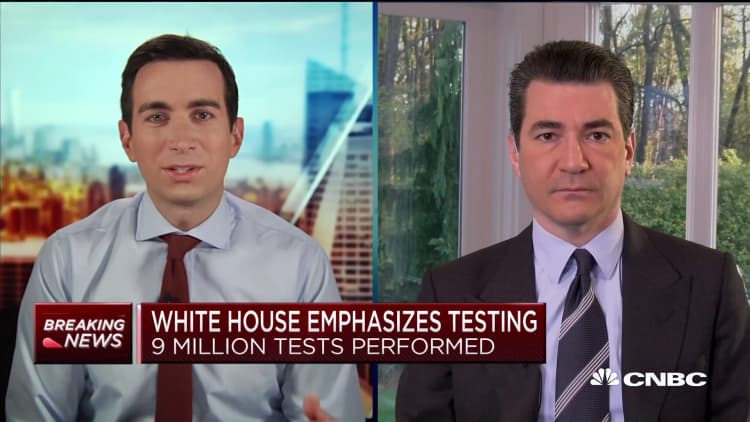
Alabama, South Dakota and Texas have already begun to see an uptick in confirmed coronavirus cases since they've eased coronavirus restrictions and begun reopening nonessential businesses, former Food and Drug Administration Commissioner Dr. Scott Gottlieb said Tuesday.
Dozens of states have lifted restrictions and allowed local businesses to reopen despite failing to meet the criteria to do so set by the White House, including at least two weeks of a sustained drop in new infections, Gottlieb said. He added that the states that have not reported an uptick yet likely will in coming days.
"The bottom line is a lot of states are now reopening activity against a backdrop that doesn't meet the criteria that the White House set out in terms of when it would be safe to reopen," he said on CNBC's "Squawk Box." "We're going to see cases go up now that we're reopening."
Gottlieb said he had hoped mitigation efforts such as stay-at-home orders would have driven down the rate of infection even further by now. Even as new cases and the daily death toll have fallen substantially in the hardest-hit parts of the country such as New York and New Jersey, the national numbers have remained stubbornly high, at almost 30,000 new cases and 2,000 new deaths per day.
"Most of us assumed that by May we'd be seeing sustained decline of new cases," said Gottlieb, a CNBC contributor who sits on the boards of Pfizer and biotech company Illumina. "We didn't think that going into May after a month of mitigation we'd be at a sort of plateau where we wouldn't be seeing steady declines of new cases, so we're in a tough spot right now."
New infections are already rising in Alabama, South Dakota and Texas, Gottlieb said. Alabama Gov. Kay Ivey let the state's stay-at-home order expire on April 30, allowing retail stores to reopen at 50% capacity. South Dakota Gov. Kristi Noem never issued a stay-at-home order and has offered guidance to businesses and schools on how to limit capacity to practice social distancing. Texas Gov. Greg Abbott announced the decision to reopen some businesses, including malls, on May 1.
Alabama has reported 10,164 confirmed cases and 403 deaths, according to the state Department of Health. The state says it has tested 129,444 people. South Dakota has confirmed 1,393 cases and 34 Covid-19 deaths, according to the state. Texas has reported 39,869 confirmed cases and 1,100 deaths, according to the state. It says it has performed 525,697 tests.
Other states, such as Georgia, which has one of the most ambitious and earliest reopening plans, have yet to report an uptick in cases. However, epidemiologists warn that the data lags anywhere from days to several weeks because the virus can take that long to develop symptoms in a person. Testing delays in less accessible parts of states could further delay the data, said Dr. Mohammed Ali, associate professor of epidemiology at Emory University in Atlanta.
"We just don't know right now, so there's this very awful nervousness in the air," Ali told CNBC. "Everybody is bracing themselves for if it picks up and if it goes faster than we expect, and there is a sort of logarithmic, exponential nature to this infection. We could have a surge like we haven't had yet."
Georgia Gov. Brian Kemp took on the White House last month when he announced plans to begin reopening large parts of the economy, including bowling alleys, barbers and nail salons, on April 24. Open businesses are held to certain requirements such as capacity limits and screening of employees for fever.
Ali described the lifting of restrictions as a "gamble" that didn't appear to be informed by data. At the time of the announcement, daily confirmed cases were rising in Georgia. The state reported its most new cases in a single day on April 20, according to the state's data, with 922 confirmed infections.
"We didn't even meet the president's guidelines of 14 days of downward trend," he said. "And here we are doing it with three or four days of downward trend. There was a lack of transparency in making the decision."
Ali said he empathizes with the economic toll mitigation restrictions have taken on people but added that if the virus spreads unconstrained throughout the state and prompts another shutdown it will only draw out the toll.
"We may see an uptick in the coming few days. We haven't yet," he said. "And when we do, it's going to be these awful, awful hot spots in the low socioeconomic areas."


